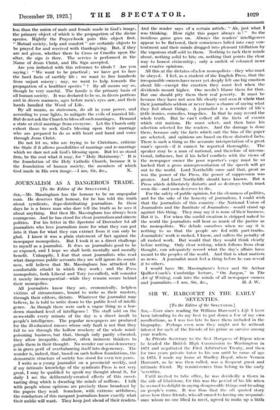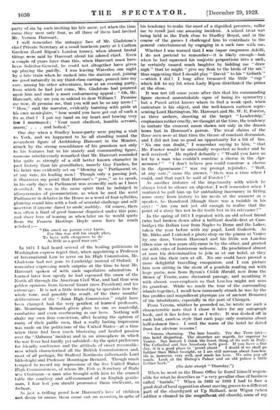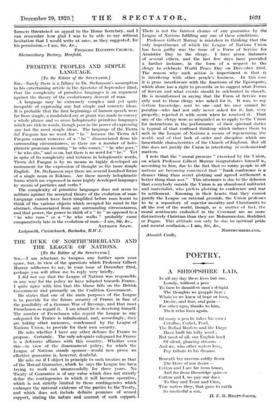SIR W. HARCOURT IN THE EARLY 'SEVENTIES.
[To the Editor of the SPECTATOR.] Sin,—Ever since reading Sir William Ilarcourt's Life I have been intending to do my best to put down a few of my own recollections, as I was too late to have them included in the biography. Perhaps even now they might not be without interest for such of the friends of his prime as survive among your readers.
As Private Secretary to the first Marquess of Ripon when he headed the British High Commission to Washington in 1871 and negotiated the First Arbitration Treaty, and then for two years private tutor to his son until he came of age in 1873, I made my home at Studley Royal, where Vernon Harcourt, as he was then called, was a frequent guest and intimate friend. My reminiscences thus belong to the early 'seventies.
Until invited to take office, he was decidedly a thorn in the side of Gladstone, for this was the period of his life-when he seemed to delight in saying disagreeable things and treading on people's corns. It was thus that the oft quoted story arose how three friends, who all owned to having one acquaint- ance whom no one liked to meet, agreed to make up a little party of six by each inviting his bele noire, yet when the time came they were only four, as all three of them had invited Mr. Vernon Harcourt.
I well remember the unhappy face of Mr. Gladstone's chief Private Secretary at a small luncheon party at 1 Carlton Gardens (Lord Ripon's London house), when almost brutal things were said by Harcourt about his adored chief. Even a couple of years later than this, when Harcourt must have been Solicitor-General, he could not altogether have given. up playing the gad-fly. I was leaving Waterloo one night by a late train when he rushed into the station and, joining me good naturedly in my third-class carriage, poured into my ears, among his other adventures, how at an evening party,.
from which he had just come, Mrs. Gladstone had pounced upon him and made a most embarrassing appeal : " Oh, Mr. Harcourt, why are you so unkind to dear William ? Promise me now, do promise me, that you will not be so any more " " How," said the narrator, evidently bursting with pride at his own saroir-faire, " how would you have got out of such a fix as that ? I put my hand on my heart and bowing very low I murmured : ' Your most obedient, humble servant, warm,' . . . and bolted."
One day when a Studley house-party were paying a visit to York, and we happened to be all standing round the recumbent figure of Archbishop Harcourt in the Minster, struck by the strong resemblance of his grandson not only to his features but to his stately and commanding figure, someone mischievously remarked that Mr. Harcourt reminded hhir quite as strongly of a still better known character in past history than his grandfather, namely Guy Fawkes, for his heart was evidently set on " blowing up " Parliament or, at any rate, its leading men I Though only a passing jest, it illustrates my point that Harcourt's " pose," so to speak, in his early days in Parliament was avowedly such as I have described. It was in the same spirit that he indulged in idiosyncrasies of pronunciation, as when he used the word Parliament in debates in the House as a word of four syllables, glancing round him with a look of scornful challenge and self- assertion if anyone dared to smile; audibly. Of course, there was often a fund of good humour disguised under this pose, and sheer love of teasing as when later on he would quote from Sir Francis Hastings Doyle some lines he much relished " His creed no parson ever knew, For this was still his simple plate To have with clergymen to do As little as a good man can."
In 1871 I had heard several of the leading politicians in Washington express regret that, when appointing a Professor of International Law to serve on his High Commission, Mr.
Gladstone had not gone to Cambridge instead of Oxford. I remember expressing much surprise at the time to hear Mr. Harcourt spoken of with such superlative admiration. I learned later how openly he had espoused the cause of the North all through the American Civil War, and had thus won golden opinions from General Grant (now President) and his entourage. It is not a little interesting to speculate how the whole tone, and possibly the result, of the three months' deliberations of the "Joint High Commission" might have been changed had the very gentlest of learned professors, Mr. Mountague Bernard, given place to one so masterful, combative and even overbearing as our hero. Nothing will shake my own firm conviction, after hearing the opinion of many of their public men, that a really lasting impression was made on the politicians of the United States--at a time when there had been much blustering and heated passion over the ' Alabama ' incident and in an atmosphere in which the war fever had hardly yet subsided—by the quiet preference for friendly conference and the attitude of sweet reasonable- ness which characterized all the British Commissioners and, most of all perhaps, Sir Stafford Northcote (afterwards Lord liklealeigh) and Professor Mountague Bernard. Though much tempted to record my impressions of the five United States High Commissioners, of whom Mr. Fish as Secretary of State was Chairman—a man. who brought with him to the council table the courtesy and self-command of an English gentle- man, I fear lest you should pronounce them irrelevant, so forbear.
As just a trifling proof how Harcourt's love of children and desire to amuse them came out on occasion, in spite of his tendency to make the most of a dignified presence, suffea- me to recall just one amusing incident. A school treat was being held in the Park close to Studley Royal, and in the course of the games I challenged him to contribute to the general entertainment by engaging in a sack race with me.
Whether I was warned that I was impa:c congress= Achilli, I do not pretend to remember—it is likely enough—but when he had squeezed his majestic proportions into a sack, he certainly caused much laughter by bidding me " draw nigh" that he might " give my flesh to the birds of the air," thus suggesting that I should play " David " to his " Goliath " —which I did ! I long after treasured the little " cup " which fell to my lot when Lady Ripon distributed the prizes at the close.
It was not till some years after this that his commanding figure showed unmistakable signs of losing its symmetry ; but a Punch artist knows where to find a weak spot, when caricature is his object, and the well-known cartoon repre- senting Lord Hartington, Mr. Harcourt and Mr. W. E. Forster, as three archers, shooting at the target " Leadership," emphasizes rather cruelly, we thought at the time, the tendency to imitate the crescent moon shown not only in the drawn bows but in Harcourt's person. The rival claims of the three men were at that time the theme of constant discussion, and I did not lose so good an opportunity for a bit of fun. " No one can doubt," I remember saying to him, " that Mr. Forster would. be universally respected as leader and be well received." He replied defiantly c "'Would you have us led by a man who couldn't construe a chorus in the Aga- memnon?" " I don't believe you could construe a chorus in the Agamemnon ! " was my prompt rejoinder. " Well, at any rate," came the answer, " there was a time when I could, and. that can't be said of Forster ! "
As another instance of the impetuosity with which he always tried to silence an objector, I well remember when I ventured to pull him up for unblushing. inaccuracy in fitting some story from history to his needs at the moment as a speaker, he thundered (though there was a twinkle in his eye) : " Are you not yet old enough to realize that the point of a story lies not in its truth but in its relevance !"
In the spring of 1874 I repeated with an old school friend (who had broken down after a brilliant double-first at Cam- bridge) the Italian tour from Naples to Rome and the Lakes, taken the year before with my pupil, Lord Goderich. As Mr. Birks and I entered a photo shop on the piazza at Venice by one door, Vernon Harcourt and his little son Lou-lou (then nine or ten years old) came in by the other, and greeted me with cries of boisterous welcome. He proclaimed almost at once his determination to join us at our hotel, as they did not like their own at all. No one could have proved a more delightful travelling companion, and I can picture him now sitting in the stern of a gondola reading out with huge gusto, now from Byron's Childe Harold, now from the Stones. of Venice, some rhetorical passage, and mouthing it with almost over-emphasis so that Lou-lou might not miss its grandeur. While we made the tour of the surrounding islands together, I recall how immensely struck he was by the fine profiles and magnificent physique (as of ancient Romans) of the inhabitants, especially in the port of Chioggia.
From Verona, whither he preceded us, he wrote me such a characteristic note that I chose it later for my autograph book, and it lies before me as I write. It was dashed off in such bold, careless style that each page only contains about half-a-dozen lines. I omit the name of the hotel he dated from for obvious reasons I
" Verona charming. The inns beastly. Try due Torre (sie)— this. hotel disgusting. The churches are superb, far superior to Venice. San Zenone I think the finest thing of its sort in Italy. The Cathedral and San Anastasia both good. If you have a fine day, it is a good place to 'prowl about.' I doubt if we shall go further than Milan to-night, as I am still nervous about Lou-lou. Re is, however, very well, and sends his love. We miss you all much. Look at the Bishop's Palace and an old palace a little farther back."
(No date except " Thursday.")
When he went to the Home Office he found himself respon- sible for what he describes as " a very peculiar class of business called ' burials.' " When in 1882 or 1883 I had to face a good deal oflocal opposition about moving graves to a different part of the churchyard at Up Holland, near Wigan (wheel adding a chancel to the magnfficent old church), some of my
'farmers threatened an appeal to the Home Secretary, and can remember how glad I was to be able to say without hesitation that I would write at once, as they suggested, for his permission.—I am, Sir, &c.,




































 Previous page
Previous page